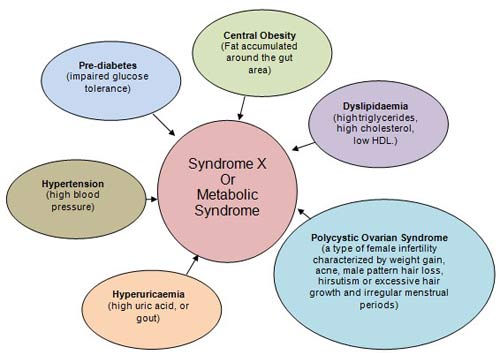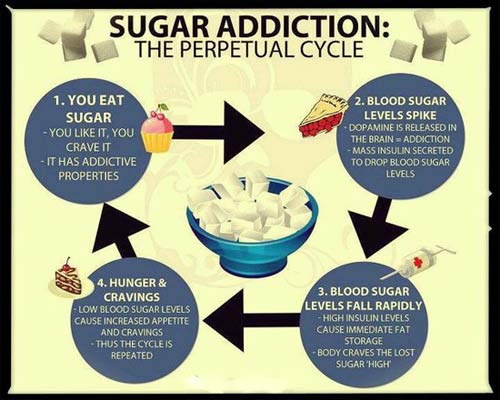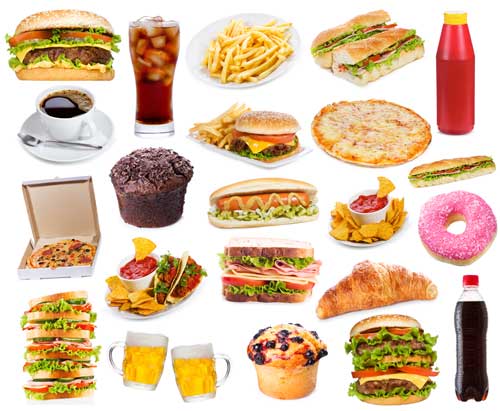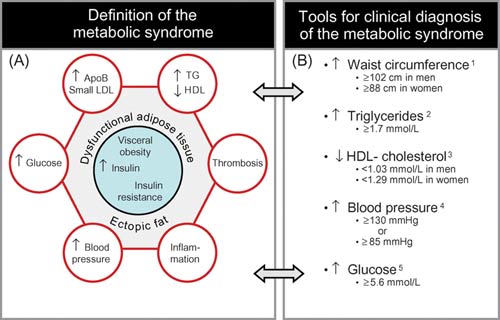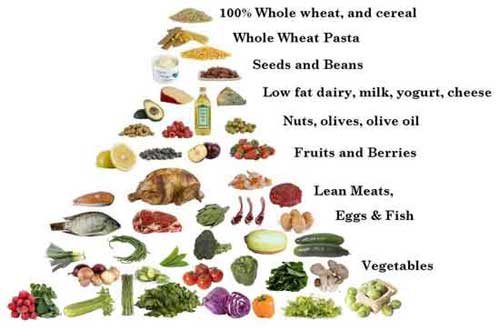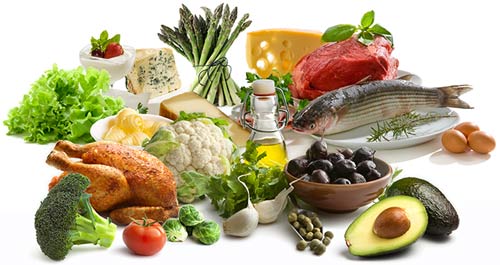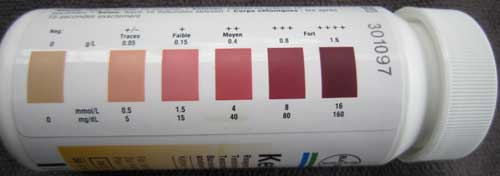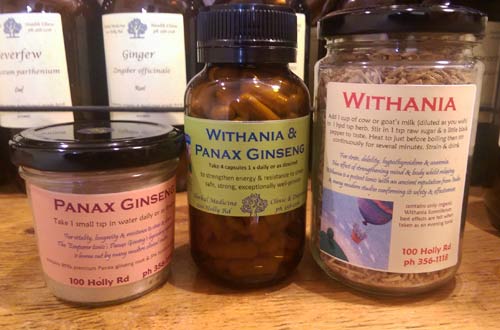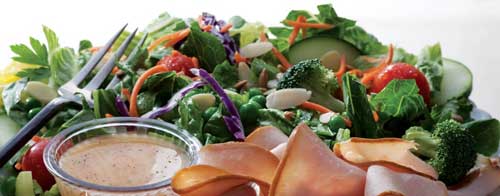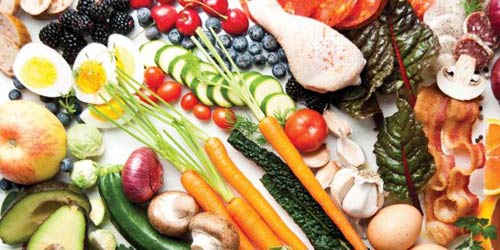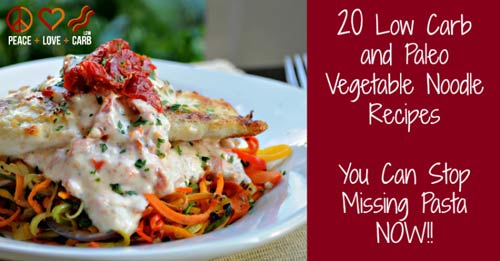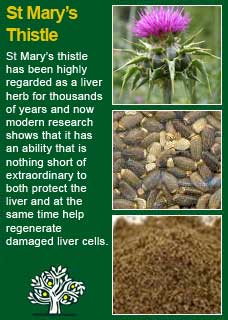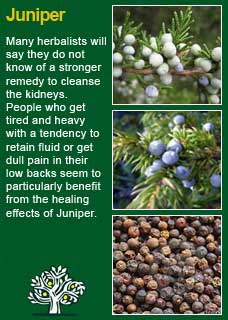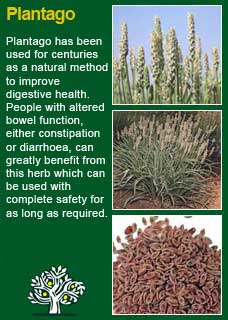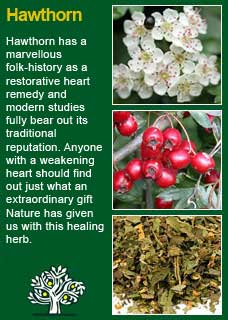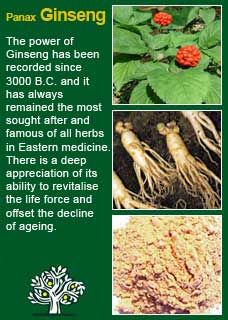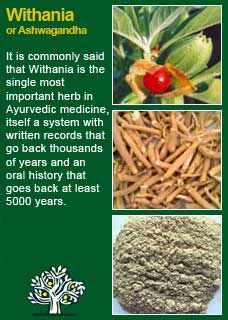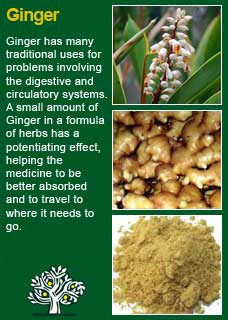
|
|
||||
| Our Pages ABOUT CONSTITUTIONAL MEDICINE
|
People who have the metabolic syndrome always have at least a few of the following signs:
The chemistry of metabolic syndrome is complex, but the heart of the problem is when our body produces higher than usual amounts of insulin in an attempt to bring down blood sugar levels that have become too high. Metabolic syndrome is the precursor of diabetes, it may take many years to get there but the metabolic syndrome often does eventually develop into diabetes if it is not effectively treated. Once a person with the metabolic syndrome starts eating significant amounts of sugar or carbohydrate-rich foods they fall prey to a cycle of sugar addiction which accelerates the problem further.
The metabolic syndrome is genetically inherited from one or both parents, who in turn inherit it from one or more of their parents, however it will only manifest if the diet is sufficiently high in carbohydrates. Arguments for why the metabolic syndrome affects so many people are compelling. People in modern society eat a much greater amount of refined foods than at any time in history, by far. The metabolic syndrome and diabetes are literally unheard of in societies that eat an unrefined, ‘primitive’ diet. In evolutionary terms our bodies have simply not had enough time to adapt to these high-sugar containing foods.
No one single blood test or symptom shows the metabolic syndrome, but it can be confidently diagnosed from a typical pattern of problems. One of the most pressing problems for many people with the metabolic syndrome is being unable to lose weight despite doing all the 'right things'. People who have metabolic syndrome are often overweight, especially around the abdomen. When this is combined with signs such as inflammation, raised blood pressure, low levels of good cholesterol, signs of liver stress etc. then you must consider the possibility that the metabolic syndrome is the core issue.
The metabolic syndrome is a genetically determined condition; if you have it then you have it for life. However, if you make some fundamental changes, especially in your diet, you can effectively cure it;
To see how much sugar can be hidden in a common food, look here. The food pyramid below gives a visual summary of which foods to eat plenty of, and which to minimise.
For people over a certain age, the idea that you can freely eat such foods is a radical notion because they have been repeatedly told that a healthy diet equals a low-fat, high-carbohydrate diet but, if you have the metabolic syndrome, nothing could be further from the truth!
If this is the case, then the person still must get moving, but should do something with very low risk of harm, such as swimming, cycling or walking. As a person gets healthier and loses significant amounts of weight, their fitness and ability to exercise will grow.
Guidelines on the process of getting into and measuring ketosis are described in detail here
Knowing what to eat is the biggest challenge for the metabolic syndrome and it is twice as hard if you try to get into ketosis. I have been impressed with the work by a group of people under the umbrella of a site called 'Diet Doctor'. I have no financial or any other kind of involvement with this site but I can see that they provide excellent support in the form of a lot of well-presented information and many delicious looking and sounding recipes Another website that I want to recommend has many resources on it that are completely free. It has been put together by Lisa MarAurele, who is a generous enthusiast for low carbohydrate eating and she gives detailed practical instuctions on how to make numerous great sounding recipes. Her work can be found at https://lowcarbyum.com/ People can cure themselves from the metabolic syndrome with diet and exercise alone but, especially if there are associated health problems, there are certain herbal medicines that can help the healing process along: Cleansing can be a key strategy when a person has signs such as high cholesterol, a roll of fat under their rib-cage, a coated tongue, an irritable mood or low motivation, poor appetite in the morning and cravings for sugar in the afternoon and evening. All these are classic indications of a liver that is in need of care and several key herbs to help in this area are mentioned below. Cleansing is given great importance in all the old traditions of medicine and, when needed, can be something of a transformative process to a person's heath status, more on the general subject of detoxification here
Celandine is certainly one of the most potent of all liver-cleansing herbs, more here Ideally, you would get these medicines from a herbalist after consulting with them in person however, there are places and situations when this will just not be possible. In which case, a safe but effective way to use them together is described in detail here
The metabolic syndrome can do a great deal of harm to the heart and if there are any such signs as; pain or weakness in the heart, high blood pressure, poor circulation or shortness of breath then, as well as treating the cause by changing the diet etc. as described above, keep yourself safe for as long as necessary with the great protector and tonic to the heart, Hawthorn.
Alongside Hawthorn, if you have hypertension and need to focus on this area then read here If you need help with problems with your heart rhythm, i.e. arrhythmia or palpitations, read here
If a person is struggling with issues such as brain-fog or a low mood, then they should get much help by taking some herbs that can reliably lift energy and mood Panax Ginseng is known as the 'Emperor tonic' in Chinese medicine and has been revered for millennia for its ability to restore energy, more about it here Withania is equally well-regarded in the Ayurvedic system of the Indian sub-continent and is used for all kinds of problems where increasing a person's vital energy is the key goal, more here
Much more than the natural 'anti-depressant' it has been marketed as, St John's wort can nourish an exhausted nervous system and lift the metabolism, more here
Curing the metabolic syndrome will dramatically improve a person's health, but the process to get there may not be a quick or easy one! Knowing how challenging this can be, the following section endeavours to cover the areas that pose the most common difficulties:
The 'how strict' question is one of the most important ones for any person who sets out on this path because their answer will have a huge impact on how hard it is for them to do the work and how fast they get results. For a person who was not especially overweight or who only had some mild health issues, a diet that simply cuts down on refined carbohydrates should serve them very well. However, for a person who was quite overweight or who had bad health because of the metabolic syndrome they should jump in the deep end, at least for a while, and completely avoid all bread in all forms, have no flour of any kind, no rice, no pasta, no potatoes, no bananas and no cereals. When people do this they typically go through a hard week where they feel like an addict coming off their drug (sugar) and then nearly always start experiencing some major improvements in their health that makes it all seem worthwhile!
Yes, in many ways, though It is not wise to eat too much protein as some systems advocate because, amongst other potential issues, it can be seen that the body will convert excess protein into sugar. That said, it should help to delve into online and printed resources from any low-carb diet system to get inspiration for recipes, help with food choices, and potentially also tap into the social support that is available out there from people who have gone through all this themselves.
Gentian is an intensely bitter herb and, of course you would hardly believe that such a thing could help, but, if needed, you must try it for yourself to see what it can do, more about Gentian here
Eggs are an ideal breakfast food because they are so rich in protein and easy to get ready. Any kind of preparation is fine and it is particularly hard to get bored with well-made omelettes including ingredients such as salmon, smoked chicken, mushroom, cheese, snow-peas, greens etc. With or without eggs it will be helpful to the blood sugar balance throughout the day to eat some protein in the morning, including things like cheese, nuts, seeds, bacon, low-carb sausages etc. These foods are higher in fat, but fat is not what causes heart disease and high cholesterol etc. if you would like to read more on that subject, read the article called 'what really causes heart disease' here
Protein; meat, fish, chicken, cheese, nuts, tofu etc. and vegetables form the basis of great meals from all cuisines and these foods can be made even more delicious using the many flavours, sauces and spices that are still perfectly okay to eat.
Lunch is the hardest meal to get right. This is the time that, unless you have planned ahead, you may only have fast foods available which, with few exceptions, are high in refined carbohydrates. This way of eating needs forwards planning. One reliable method is making larger quantities of the protein & vegetable dishes at dinner and using the extra amount for one or more lunches. You do not have to feel hungry to successfully treat the metabolic syndrome. There are plenty of options when it comes to snacks including cheeses, nuts and seeds, olives, salami or dried meats, moderate amounts of citrus fruits, grapes, kiwifruits, apples, pears etc.
Fruit is usually ok in moderation, unless you are trying to go into ketosis in which case it may have to be restricted for a while. Fruit sugars are metabolised more readily than starch sugars, so you don't get the same insulin spikes from fruit that you do from bread or rice etc. Bananas are unfortunately not okay to eat; the process of gas-ripening bananas makes them so high in sugars that they raise insulin levels too high. Dried fruits are usually okay but only in moderation, e.g. no more than a few dates or dried apricots in a day. People who need to lose a lot of weight and turn their metabolic disorder around rapidly may be wise to eat no more than one or two pieces of fruit a day and not to eat dried fruits at all. Most people with the metabolic syndrome will be fine with several pieces of fruit a day and in fact soon find that fruit tastes better than ever before because the body is becoming re-sensitised to natural sugars.
The short answer is no, because the brain still registers the sweetness even without the sugar and the hormonal imbalances that come with the metabolic syndrome continue to be provoked. In a short while you will find your tastes change and you feel the natural sweetness in food much more intensely.
Tea and coffee are completely fine, but you will need to lose the teaspoon of sugar habit, at least until you have broken the cycle of the metabolic syndrome and are back in good health. Most people count how much sugar they have in a day by how much they put in their tea of coffee, but the reality is that we consume far more sugar in carbohydrate-rich foods than we do in table sugar. If you want to have an alcohol-containing drink, then you must avoid both beer and wine as they are far too high in sugar not to push you back into insulin-resistance. On the other hand, spirits such as vodka, scotch, tequila etc, are perfectly acceptable, go figure!
Aim for at least 6 cups a day, more if you need it. A good strategy to develop the hydration habit is to put a large glass jug full of water somewhere in your home or office as a visual reminder and measure of how much you have drunk. Adding some lemon or herbs such as lemon balm or mint to the water keeps it fresh and pleasant to drink.
When people start cutting out the sugar in their diet they typically go through a kind of withdrawal process and anyone that goes through this will tell you with conviction that sugars really are addictive. They typically feel strong cravings for bread, pasta, sugar etc. that no amount of cheese, nuts, meat etc. can fulfil. This is normal and not to be worried about; your body is learning how to work with a different kind of fuel and this is always hardest at the beginning. The best thing to do with a carbohydrate craving is to not feed it! You can certainly eat some protein -- there is no need to go hungry, but you may find that the craving is not about being hungry; rather a weird kind of emptiness that it feels like only sugar will fill up. That's when you can appreciate how addictive these foods are, and it will make abundant sense as to why the shopping trolleys of the western world are basically full of sugar in one form or another. I strongly encourage my patients who have the metabolic syndrome to take time to think about what they are going to eat. You cannot cure the metabolic syndrome by continuing to eat everything you are used to eating minus the bread, flour, biscuits, pasta etc. This won't be sustainable unless you find new ways to prepare foods that are both delicious and desirable and, in this regard, I think it is essential to eventually start going online to find recipes from websites from people who have cured their own heath with changing their diet and want to share what worked for them. This link was given above, under the keto-diet section, and I will put it here also as it is at least one good online source to get support, especially with the vital question of 'what to eat' - more here Above all, and most especially when you are starting out with this, give yourself time. Time to think, time to read, time to shop, time to cook. There is nothing more valuable than your time and nothing more precious than your health, put them together and see what happens! You'll know you are doing it right when you feel like you are eating like a King or Queen.
Finally, you might benefit from learning about your constitution to know what kind of foods, herbs, exercises etc. will work especially well for your health in general. Constitutional health is an old and fascinating way of understanding our differences. There's a brief introduction here and a more detailed section on working out which constitution you are here
Please understand that I cannot personally advise you without seeing you in my clinic. |
|
|
© 2011 R.J.Whelan Ltd
